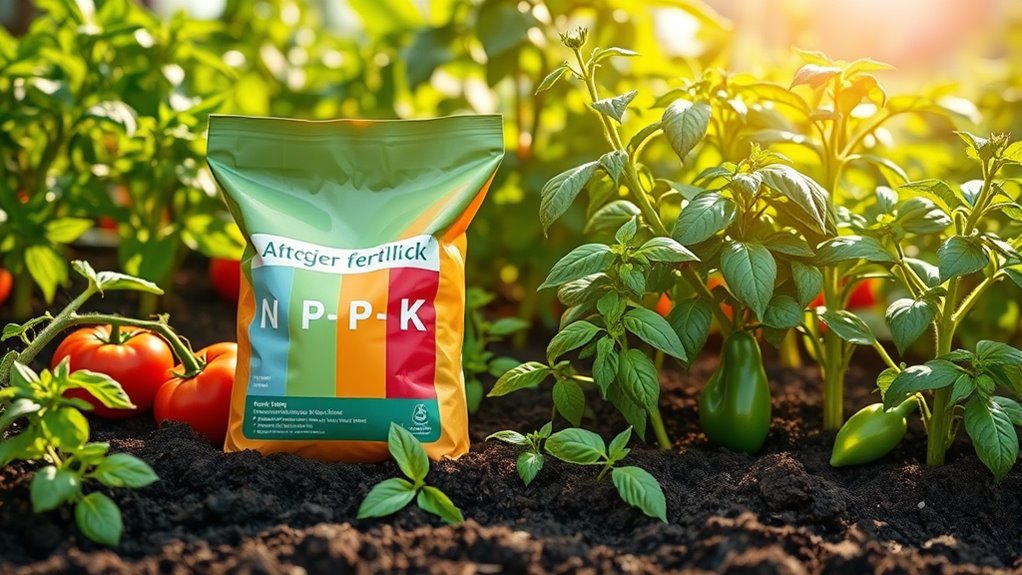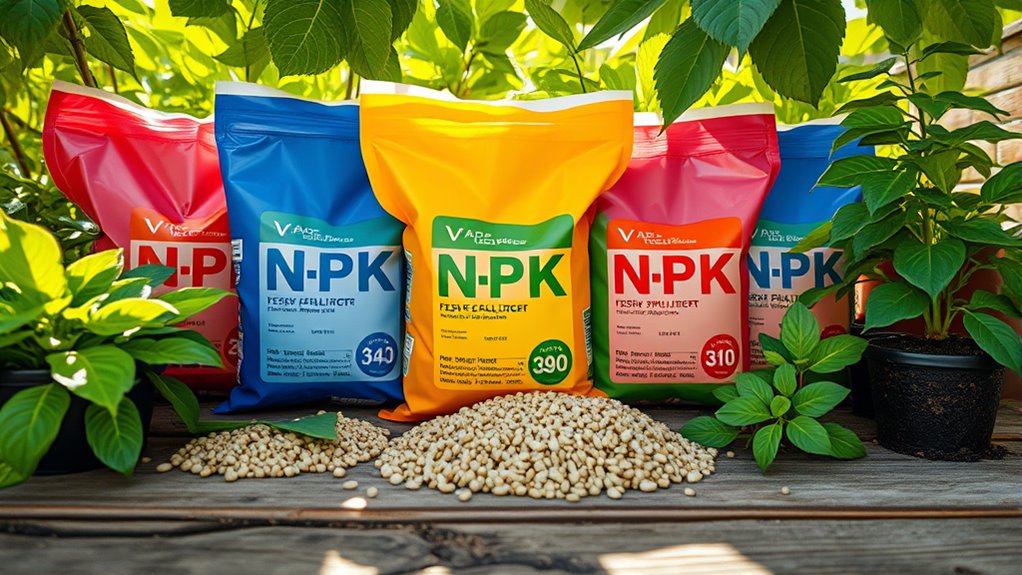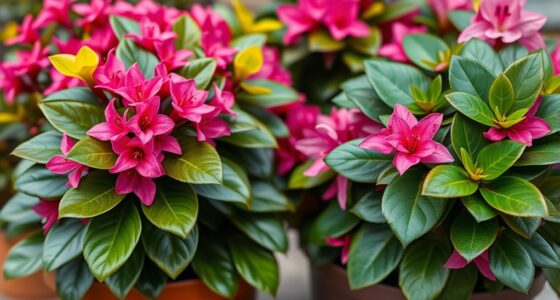Fertilizer 101 starts with understanding N-P-K ratios, which show the amounts of Nitrogen, Phosphorus, and Potassium your plants need. Nitrogen helps leafy growth, phosphorus encourages roots and flowers, and potassium boosts overall vigor and resistance. Choosing the right balance depends on your plant’s stage and needs. Using organic fertilizers can support steady growth and improve soil health. Keep exploring, and you’ll discover how to match your plants’ specific requirements for a thriving garden.
Key Takeaways
- N-P-K ratio indicates the levels of nitrogen, phosphorus, and potassium in fertilizers, guiding nutrient support for plant growth stages.
- Nitrogen promotes leafy, vegetative growth; phosphorus encourages root development and flowering; potassium boosts overall plant health.
- Selecting the right fertilizer depends on your plants’ specific needs and their growth phase, whether focusing on foliage or flowering.
- Organic fertilizers release nutrients slowly, improve soil structure, and provide essential micronutrients for resilient plants.
- Conduct soil tests to determine deficiencies and choose amendments and fertilizers that optimize soil health and plant development.

Have you ever wondered what makes plants grow strong and healthy? The secret often lies in understanding how to nourish them properly. One essential aspect is the use of soil amendments and organic fertilizers, which improve soil health and provide vital nutrients. Soil amendments are materials added to your soil to enhance its structure, fertility, and drainage. They can include compost, manure, peat moss, or biochar. These amendments help create a better environment for roots to expand and absorb nutrients efficiently. Organic fertilizers, on the other hand, are natural sources of nutrients derived from plant or animal materials. They release nutrients slowly, promoting steady growth and reducing the risk of over-fertilization. Combining soil amendments with organic fertilizers can transform tired, nutrient-deficient soil into a thriving foundation for your plants.
When it comes to understanding what your plants need, the key is recognizing the importance of balanced nutrition. This is where the N-P-K ratio comes into play. N-P-K stands for nitrogen, phosphorus, and potassium, the three primary nutrients plants require in large quantities. Nitrogen fuels lush, leafy growth; phosphorus encourages healthy root development and flowering; and potassium helps with overall plant vigor and disease resistance. By choosing fertilizers with the right N-P-K ratio, you ensure your plants get the nutrients they need at different growth stages. For example, a fertilizer high in nitrogen supports vigorous foliage, while a balanced or phosphorus-rich formula boosts flowering and fruiting.
Getting familiar with organic fertilizers is equally important. These include compost, bone meal, fish emulsion, and kelp extract, which are rich in nutrients but release them gradually. Organic fertilizers improve soil structure as they break down, increasing the soil’s ability to hold water and nutrients. This slow-release process helps prevent nutrient runoff and reduces environmental impact. Additionally, organic options often contain a variety of micronutrients that synthetic fertilizers may lack, contributing to overall plant health and resilience. Understanding the benefits of soil health can lead to more successful gardening practices.
Incorporating soil amendments and organic fertilizers into your gardening routine doesn’t have to be complicated. Start by testing your soil to understand its current condition. Then, add suitable soil amendments to correct deficiencies and improve texture. Follow up with organic fertilizers tailored to your plants’ growth stages. Doing so creates a nourishing environment that promotes healthy, vigorous growth. Remember, healthy soil is the foundation of thriving plants, and nurturing it with amendments and organic fertilizers ensures your garden will flourish.
Frequently Asked Questions
How Do I Choose the Right Fertilizer for My Specific Plants?
To choose the right fertilizer for your plants, start with soil testing to identify nutrient deficiencies. Knowing your plants’ specific nutrient needs helps you pick a fertilizer with the correct N-P-K ratio. Observe your plants for signs of poor growth or discoloration, and adjust accordingly. This way, you give your plants what they need to thrive, ensuring healthy growth and vibrant blooms.
Can Over-Fertilizing Harm My Plants or the Environment?
Think of your plants as delicate dancers; over-fertilizing can throw off their rhythm. Yes, it can harm them by causing nutrient imbalance, leading to weak growth or root damage. Plus, excess fertilizer can wash away in runoff, polluting nearby water sources. To keep your garden in harmony, follow recommended application rates and avoid overdoing it. Balance is key to nurturing healthy, thriving plants and protecting the environment.
What Are Natural Alternatives to Chemical Fertilizers?
You can replace chemical fertilizers with natural options like organic compost, which enriches soil naturally and improves plant health. Plant teas, made from ingredients like seaweed or compost, provide essential nutrients without chemicals. These alternatives are eco-friendly, safe for your plants, and help maintain soil balance. Using organic compost and plant teas supports sustainable gardening, promotes healthy growth, and reduces environmental harm caused by synthetic fertilizers.
How Often Should I Fertilize Indoor Versus Outdoor Plants?
Imagine nurturing a delicate garden, where each visit brings renewal. For indoor plants, fertilize every 4-6 weeks, adjusting to their growth and your watering schedule. Outdoor plants, like a thriving landscape, need feeding every 4-8 weeks during the growing season. Keep pest control in mind, and avoid overfeeding. Regular watering and attentive care guarantee your plants flourish, whether inside or out.
Are There Seasonal Considerations for Fertilizing Different Plants?
You should consider seasonal growth and watering schedules when fertilizing your plants. During active growth in spring and summer, plants need more nutrients, so fertilize more frequently. In fall and winter, their growth slows, and you can reduce fertilizing. Adjust your watering schedules accordingly, ensuring soil stays moist but not waterlogged. This approach helps your plants thrive year-round, matching their natural seasonal cycles and minimizing stress.
Conclusion
Understanding N-P-K helps you choose the right fertilizer for your plants, ensuring they thrive. While it might seem complicated at first, focusing on these three numbers makes it easier to meet your garden’s needs. Don’t worry if you’re just starting out—plants are surprisingly forgiving. With a little knowledge and attention, you’ll see healthy, vibrant growth. So go ahead, give your plants what they need, and enjoy a lush, flourishing garden all season long.









